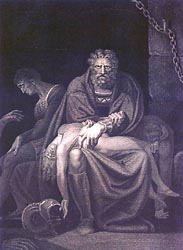For the Sexes: Gates of Paradise, Plate 10, (E 264)
"10 Help! Help!"
For the Sexes: Gates of Paradise, Plate 19, (E 268)
Keys
"10 In Times Ocean falling drownd In Aged Ignorance profound"
Approximately half of the picture is occupied by the cloudy sky and
half by the stormy sea. The man's head and arm protrude from the
water into the air. The man looks upward and reaches with his
outstretched arm to the heavens above. The fingers of his five
senses are spread to grasp whatever help is offered from above.
There seems to be a flotation device to the right of the man which
he ignores.The man is in a situation in which help is required. He is in danger of drowning in the sea of time and space, what we usually think of as the material world with its cares and pleasures, its demands and opportunities. He has grown accustomed to the life he endures, but if he notices that his life is barren and bleak he may seek help from above.
Blake sees the divided, fallen man in such a position. He has gotten in over his head and isn't a very good swimmer. But Blake's concept is that man's call for help should be addressed within. Although there are four internal aspects of man, they need not be at war with one another. The God who dwells within each one can make known to us the ways in which our intuition, reason, emotions and sensation are causing us to suffer and to cause suffering.
This plate returns us to the Zoa Tharmas whom Blake identifies with the Western gate of Genesis which was closed when Adam and Eve were expelled from Eden. Blake conceived that man would reenter Eden when he was able to perceive everything as it is: infinite and holy.
Marriage of Heaven & Hell, Plate 14, (E 39)
"The ancient tradition that the world will be consumed in fire
at the end of six thousand years is true. as I have heard from
Hell.
For the cherub with his flaming sword is hereby commanded to
leave his guard at the tree of life, and when he does, the whole
creation will be consumed, and appear infinite. and holy whereas
it now appears finite & corrupt.
This will come to pass by an improvement of sensual enjoyment.
But first the notion that man has a body distinct from his
soul, is to be expunged; this I shall do, by printing in the
infernal method, by corrosives, which in Hell are salutary and
medicinal, melting apparent surfaces away, and displaying the
infinite which was hid.
If the doors of perception were cleansed every thing would
appear to man as it is: infinite."
Jerusalem, Plate 38 [43], (E 184)
"They saw America clos'd out by the Oaks of the western shore;
And Tharmas dash'd on the Rocks of the Altars of Victims in Mexico.
If we are wrathful Albion will destroy Jerusalem with rooty Groves
If we are merciful, ourselves must suffer destruction on his Oaks!
Why should we enter into our Spectres, to behold our own corruptions
O God of Albion descend! deliver Jerusalem from the Oaken Groves!
Then Los grew furious raging: Why stand we here trembling around
Calling on God for help; and not ourselves in whom God dwells
Stretching a hand to save the falling Man: are we not Four
Beholding Albion upon the Precipice ready to fall into Non-Entity:
Seeing these Heavens & Hells conglobing in the Void."
Jerusalem, Plate 40 [45], (E 187)
"In Selfhood, we are nothing: but fade away in mornings breath,
Our mildness is nothing: the greatest mildness we can use
Is incapable and nothing! none but the Lamb of God can heal
This dread disease: none but Jesus! O Lord descend and save!
Albions Western Gate is clos'd: his death is coming apace!
Jesus alone can save him; for alas we none can know
How soon his lot may be our own."
Milton, Plate 15 [17], (E 109)
"First Milton saw Albion upon the Rock of Ages,
Deadly pale outstretchd and snowy cold, storm coverd;
A Giant form of perfect beauty outstretchd on the rock
In solemn death: the Sea of Time & Space thunderd aloud
Against the rock, which was inwrapped with the weeds of death
Hovering over the cold bosom, in its vortex Milton bent down
To the bosom of death, what was underneath soon seemd above.
A cloudy heaven mingled with stormy seas in loudest ruin;
But as a wintry globe descends precipitant thro' Beulah bursting,
With thunders loud and terrible: so Miltons shadow fell
Precipitant loud thundring into the Sea of Time & Space."
Jerusalem, Plate 13, (E 156)
"The Western Gate fourfold, is closd: having four Cherubim
Its guards, living, the work of elemental hands, laborious task!"
Genesis 3
[22] Then the LORD God said, "Behold, the man has become like one of us, knowing good and evil; and now, lest he put forth his hand and take also of the tree of life, and eat, and live for ever" --
[23] therefore the LORD God sent him forth from the garden of Eden, to till the ground from which he was taken.
[24] He drove out the man; and at the east of the garden of Eden he placed the cherubim, and a flaming sword which turned every way, to guard the way to the tree of life.
.
















